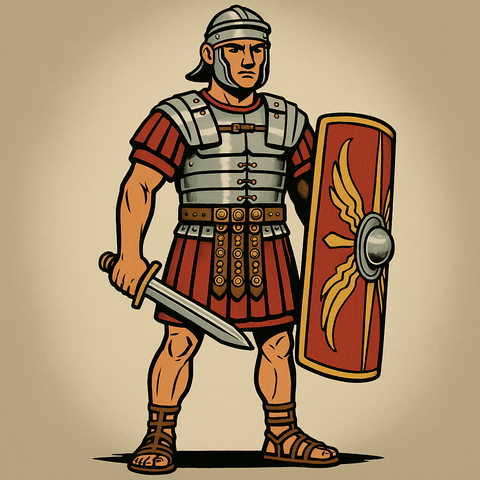
Quotes in Ephesians
Ephesians quotes from the Old Testament 3 times.
Ephesians 4:8 quoting Psalm 68:18 (Syr)
Ephesians 4:8
‘To the highest places, he’s stepped up,
And he led captives into captivity;
Then, he gave gifts to the people.’
Psalm 68:18 (67:19 in LXX numbering)
Greek Septuagint (our translation):
‘To the highest places, You stepped up,
And You’ve taken captives into captivity;
You siezed gifts [and shared them] among the people,
And camp among those who disobey!’
❌ Differs, but matches with some explanation
Hebrew Masoretic Text (BibleHub’s concordance):
‘You have ascended on high, you have led captive [a] captivity, you have received gifts among men […]‘
❌ Differs, but matches with some explanation
Dead Sea Scrolls (WEB):
(None of the surviving Dead Sea Scrolls contain this verse.)
Aramaic Peshitta Bible:
‘You have ascended on high and you have captured captivity and you have given gifts to the children of men […].’
✅ Matches as a paraphrase
Our comments:
Unusually, neither the Septuagint nor the Hebrew match what Paul said.
The issue is over Paul’s statement, ‘he gave gifts to the people’.
- The Greek Septuagint literally says ‘You-received gifts among men/people’.
- The Hebrew text literally says ‘you-have-received gifts among-men’.
These don’t appear to match what Paul said.
The Aramaic Peshitta Bible, however, matches what Paul said perfectly:
‘you have given gifts to the children of men’.
For this reason, we mark this verse as ‘Syr’, meaning ‘Syriac’ (referring to the Aramaic Peshitta Bible, which is written in the Syriac dialect of Aramaic), as it is the only version that matches Paul’s words.
So what happened here? Did Paul choose to quote the Aramaic version, even though it contradicts the Hebrew and Greek? Or was both the Septuagint mistranslated and the Hebrew text corrupted? Or was the Aramaic Peshitta adjusted to match Paul’s words later on?
No, none of that.
A simpler explanation is that Hebrew is simply misunderstood, and since the Greek text was translated very literally, it’s misunderstood in the same way.
The Hebrew text has a subtle implication that isn’t immediately obvious to us. When it says, ‘you-have-received gifts among-men‘, the word among may imply that the gifts that he received were immediately shared with the men. The Greek uses an equivalent word that can mean both ‘among’ and ‘with’ or even ‘by means of’.
Yes, He receives gifts, and shares them with the men. He receives gifts and distributes them among the men. He receives gifts using (by means of) the men.
If this explanation is correct, then all the sources match up perfectly!
Indeed, we can view the Aramaic Peshitta version as confirming it. Since the translator was 2,000 years closer to the text that we are today, it’s an early witness to the text that helps us understand ambiguous wording.
- For a more in-depth discussion of this verse, see our translator note on Ephesians 4:8.
Ephesians 5:31 quoting Genesis 2:24
Ephesians 5:31
‘A man will leave his father and mother and stick with his woman, and the two will become one flesh.’
Genesis 2:24
Greek Septuagint (our translation):
‘Because of this, a man will leave his father and mother
[…]
And the two will become one flesh.’
✅ Match
Hebrew Masoretic Text (JPS):
‘Therefore shall a man leave his father and his mother, […] and they shall be one flesh.’
✅ Match
Dead Sea Scrolls (WEB):
(None of the surviving Dead Sea Scrolls contain this verse.)
Our comments:
Matches well with both sources.
Ephesians 6:3 quoting Exodus 20:12 or Deuteronomy 5:16
Ephesians 6:3
‘…that things would go well for you, and that you may live a long time on the land.’
Exodus 20:12
Greek Septuagint (our translation):
‘…so that things may go well for you and that you may live a long time in the land […]‘
✅ Match
Deuteronomy 5:16
Greek Septuagint (our translation):
‘…so that things may go well for you and that you may live a long time in the land […]‘
✅ Match
Hebrew Masoretic Text (JPS):
‘[…] that thy days may be long, and that it may go well with thee, upon the land […]‘
✅ Match
Dead Sea Scrolls (WEB):
(None of the surviving Dead Sea Scrolls contain this verse.)
‘[…] that your days may be long, and that it may go well with you, in the land […]’ – Scroll 4Q41
✅ Match
Our comments:
Matches well with all sources.
Quotes Index
- Matthew (27)
- Mark (13)
- Luke (16)
- John (11)
- Acts (34)
- Romans (62)
- 1 Corinthians (17)
- 2 Corinthians (11)
- Galatians (11)
- Ephesians (3)
- Philippians (1)
- Colossians (0)
- 1 Thessalonians (0)
- 2 Thessalonians (0)
- 1 Timothy (1)
- 2 Timothy (2)
- Titus (1)
- Philemon (0)
- Hebrews (30)
- James (4)
- 1 Peter (10)
- 2 Peter (4)
- 1 John (0)
- 2 John (0)
- 3 John (0)
- Jude (1)
- Revelation (7)